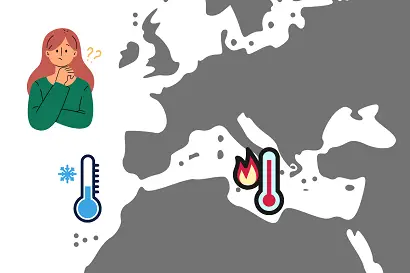Due to its smaller size and shallower depths, coastal winds have a greater effect on surface water temperatures in the Mediterranean Sea than in the Atlantic.

The Atlantic Ocean is often considerably cooler than the Mediterranean Sea. There are a number of causes for this, one of which is location. In comparison to the Atlantic Ocean, the Mediterranean Sea is located significantly closer to the equator and, thus, at warmer latitudes.
This causes temperatures in most portions of the Mediterranean to remain more consistent year-round compared with its more turbulently temperature-fluctuating ocean counterpart.
Why is the Mediterranean warmer than the Atlantic?
The Mediterranean is warmer than the Atlantic because it has a more dominant effect from global circulation patterns. The ocean waters in the Mediterranean are generally warm year-round, while the Atlantic experiences cooler temperatures due to greater variability in circulation patterns.
This is largely due to the effects of global monsoonal cycles, which cause temperature fluctuations in both oceans. Additionally, the Mediterranean lies closer to subtropical and tropical regions, where there tends to be more warm water upwelling.
In contrast, upwelling occurs less frequently in the Atlantic where currents push warm water away from shorelines and develops a colder current. As a result, cold water continues to flow away from shorelines during summer months while restricting current movement in winter months within parts of the Mediterranean Sea.
These differences explain why the Mediterranean is much warmer than its Atlantic counterpart.
Is the Atlantic the coldest ocean?
While the Atlantic Ocean is certainly not the coldest ocean in the world, it can experience some pretty chilly temperatures. Studies have found that the average temperature of the Atlantic is somewhere between 39 and 45 degrees Fahrenheit.
This isn’t as cool as some other oceans, like the Arctic or Southern Oceans, where temperatures often drop to near-freezing levels. Yet what the Atlantic lacks in temperature, it makes up for in size – it’s around 4 times larger than any other ocean on Earth!
Additionally, one of its key features is that Atlantic thermal currents and winds heavily influence Europe’s overall climate by carrying warm air to continental regions; without this assistance, Europe’s climate would be much colder than it is today.
Is the Mediterranean saltier than the Atlantic?
The answer to the question of whether the Mediterranean is saltier than the Atlantic is a bit complicated. Generally speaking, ocean salinity depends heavily on evaporation versus precipitation rates in a given area; when evaporation outpaces precipitation, more salt will be left behind and the salinity levels will rise.
In comparison to other seas, both the Mediterranean and Atlantic are relatively saline as they are differentially isolated from any significant source of freshwater.
That being said, there are certain factors that influence salinity within these two bodies of water. For example, the average salinity level for the Atlantic Ocean hovers around 35 parts per thousand whereas in areas like the Gulf of Cadiz it can reach levels of 38 ppt.
Meanwhile, due to its smaller area and lack of connection to inland waters, the Mediterranean’s basin-wide average salinity measures close to 39 ppt with high numbers recorded at around 42 ppt in some areas.
Therefore according to this research, it appears that upon deeper examination, it could be inferred that overall salinity levels may indeed be higher in the Mediterranean than they are in the Atlantic Ocean.
Which of the 5 oceans is the coldest?
Of the world’s five oceans, the Arctic Ocean is considered to be the coldest. This ocean is situated at the northernmost pole of Earth and is composed almost entirely of polar waters, resulting in an extremely low average annual temperature between 28 and 30 degrees Fahrenheit.
Although still water can reach temperatures as low as -2 degrees Fahrenheit in certain locations, sea temperatures usually don’t dip lower than 28 degrees Fahrenheit due to its shallow depth and the presence of continuous currents that carry warmer water from more temperate areas.
Additionally, although the ice caps continuously shrink due to global warming, freshwater serves as insulation for this ocean due to its high salinity levels. For example, Arctic ice averaged 6 feet thick at its peak during wintertime in 1976 versus 4 feet thick thirty years later in 2006.
These factors contribute not only to extreme weather conditions across many countries but also provide a unique environment for fragile species such as narwhals, belugas, and polar bears, who find refuge—and food sources—in one of the world’s most unforgiving environments.
What is the warmest ocean?
The warmest ocean on earth is the Indian Ocean. Located in the southwest of Asia and south of India, it spans over 28 million square miles and includes parts of the Atlantic, Pacific, and Arctic Oceans making it the third largest ocean.
With an average temperature of around 82-86°F, it’s one of the warmest oceans in the world, a stark contrast to some areas that have an average temperature as low as -2°F.
Unlike some other oceans that are surrounded by continents with thermal or cooling effects, the Indian Ocean does not have many landmasses surrounding it which contributes to its overall warmer temperatures.
In addition to its impressive size and warm climate, this ocean contains numerous aquatic species such as dolphins, whale sharks, sea turtles, and even sea horses making it a great location for eco-tourism.
Conclusion
The Mediterranean Sea is more susceptible to the effects of coastal winds on surface water temperatures than the Atlantic Ocean because of its smaller size and shallower depths.
It’s common to find the Atlantic Ocean to be several degrees cooler than the Mediterranean. Some of the reasons for this can be found in the area in which they are found. The Mediterranean Sea is located far closer to the equator than the Atlantic Ocean, making it a lot warmer.
As a result, year-round temperatures in most of the Mediterranean are more stable than the more erratic temperatures found in the ocean.
- The Top Restaurants Specializing in Truffle Dishes - August 10, 2023
- Truffle Panna Cotta: A Decadent Dessert Recipe for Truffle Lovers - August 7, 2023
- Truffle Scrambled Eggs: A Luxurious Breakfast Delight - August 7, 2023








